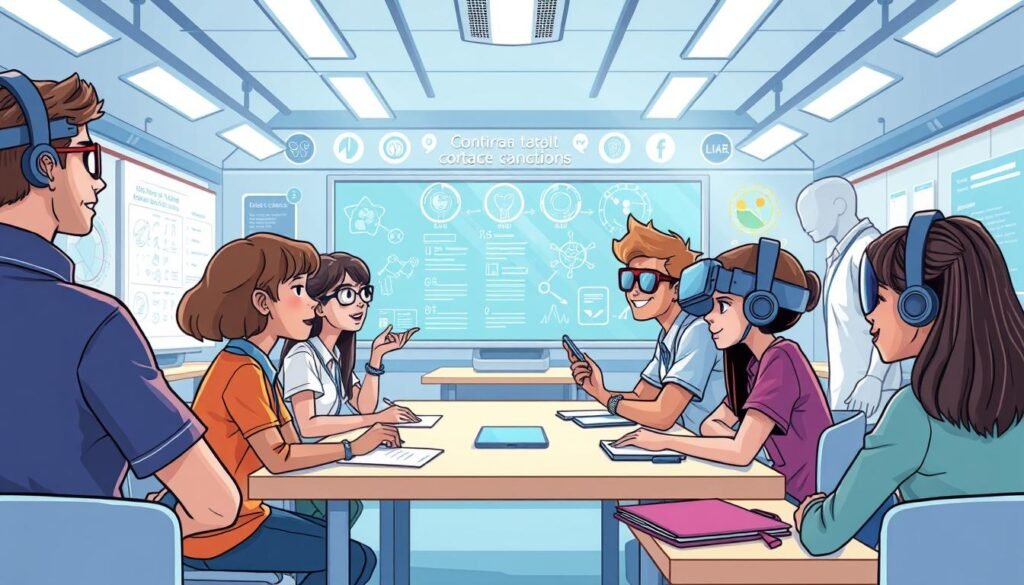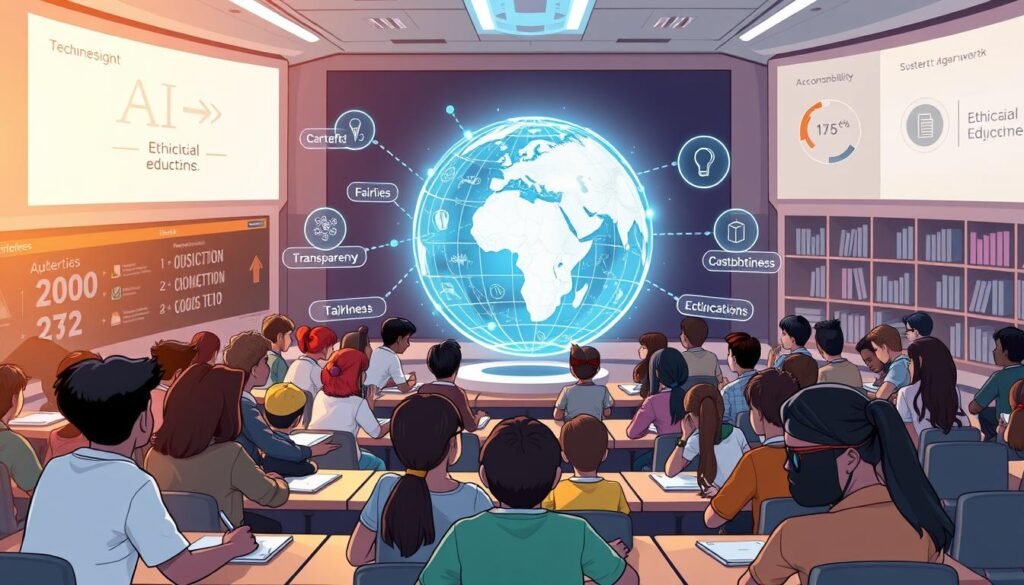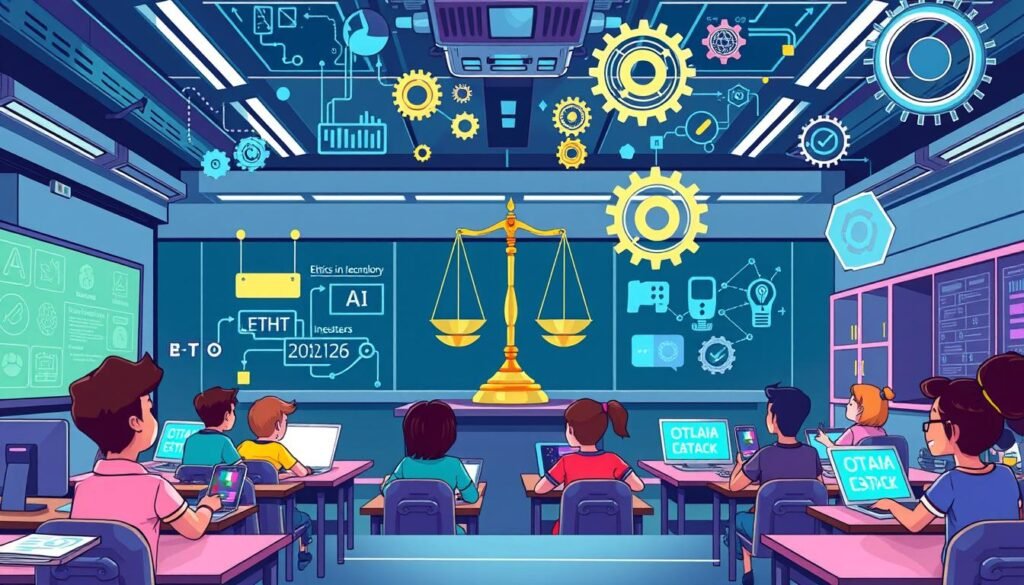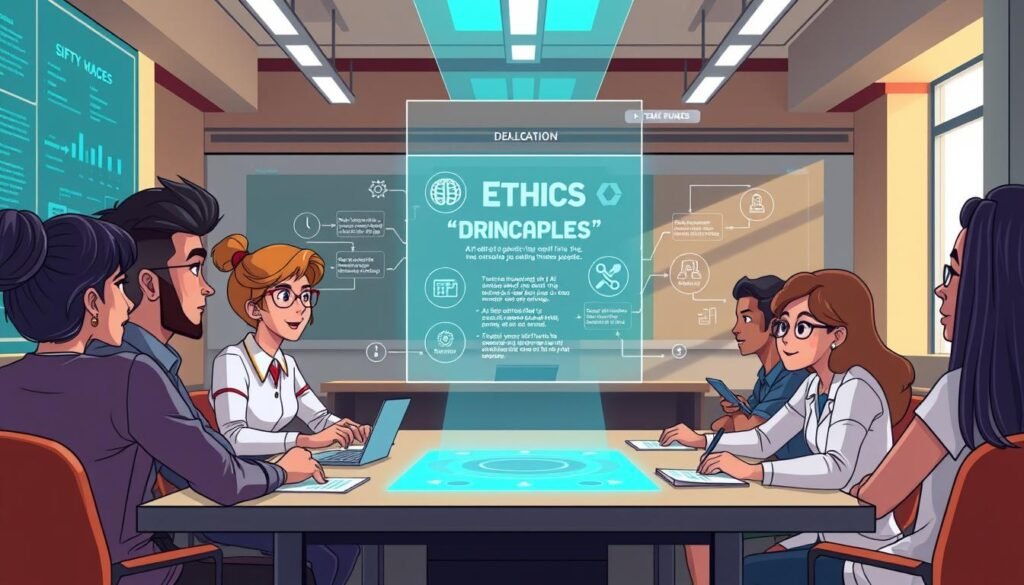As AI changes how we learn, we must ask: Is progress worth the risks? This question leads us to look at AI’s many ethical sides, from keeping data safe to making sure everyone has access to learning.
AI aims to make learning more personal but raises big questions. For example, 12 million US students can’t get online at home, making it hard for them to use AI tools that could help them learn1. Also, with more data breaches in schools, keeping student info safe is more important than ever1.
It’s crucial to think deeply about AI’s ethics and teach it responsibly. Studies show AI can be unfair, with tools grading students 37% worse if they’re from minority groups2. Also, 63% of teachers worry AI might make it harder to connect with their students1.
This journey shows how vital AI ethics education is. It’s about making sure new tech is fair, open, and helps everyone learn. As we move forward, let’s find a way to use AI that respects and supports all learners.
Key Takeaways
- The digital divide affects 12 million US students, limiting their access to AI educational tools.
- Data privacy breaches in education rose by 56% last year, highlighting urgent security needs.
- AI-grading systems may show a 37% bias against minority students, questioning fairness in assessments.
- Many teachers fear AI could harm the quality of student interactions, according to 63% of respondents.
- Understanding the social and ethical implications of AI is crucial in fostering responsible education.
Introduction to AI in Education
The use of AI in education is changing how we teach and learn. Over the years, AI has opened up new ways for students to learn. For example, a team in California created a game to teach high school students about AI and computational thinking3.
AI tools are making learning more personal. Teachers can now create lessons that fit each student’s needs. There are even AI exhibits for kids to learn about AI in fun ways4. Also, a group is working on using AI to teach young kids and their families through a virtual AI avatar3.
But, AI in education also raises important questions about ethics in AI. Issues like bias, accountability, and privacy are becoming more pressing. It’s essential to teach both students and teachers about the ethics of AI5.
Understanding AI and Its Applications in Education
In today’s schools, defining artificial intelligence and machine learning is key. AI makes computers think like humans, solving problems that need human smarts. Machine learning helps computers get better at tasks by learning from data. This mix of AI and education brings new ways to tackle classroom challenges, making learning better and more fun.
Defining Artificial Intelligence and Machine Learning
AI tools are changing how we learn. They can look at lots of data to find trends and patterns. This helps teachers see how students are doing and what works best in class.
For example, AI can help make learning fit each student’s needs. This means students get to learn in ways that really work for them. It also helps teachers by making lessons more engaging and helping students understand better.
Common Uses of AI Tools in Educational Settings
AI is being used in many ways in schools. Tools like DreamBox and Smart Sparrow adjust lessons for each student. This makes sure everyone gets the right challenge and help.
Also, automated assessment systems like Gradescope make grading easier. This lets teachers focus more on teaching. AI helps schools make better choices about how to teach and what resources to use.

The California Department of Education is using AI in its programs. They want teachers to know how to use AI to teach better6. This is part of a bigger trend where schools use AI to improve learning. It’s important for students and teachers to understand these technologies in today’s world7.
The Benefits of AI Integration in Education
Exploring AI benefits in education shows how it can change learning for the better. AI can adjust lessons to fit each student’s needs, making learning more effective. This is especially true for adaptive learning platforms that change the difficulty of tasks based on how well students do.
Such personalization helps students stay engaged and do better in school. It shows why AI is so important in today’s classrooms8.
Personalized Learning Experiences
AI helps teachers find out which students need extra help with certain topics. This targeted approach creates a learning environment that meets each student’s needs. It also makes learning more supportive and effective8.
AI can analyze lots of data to spot trends and predict how students will do. This helps teachers make better decisions and improve learning for everyone8.
Efficiency in Assessment and Feedback
AI makes grading and feedback faster and easier. Automated systems let teachers focus more on teaching. They also provide quick, helpful feedback to students8.
This makes teaching less stressful and helps students learn faster. It ensures they get feedback quickly to improve their understanding.
Teachers need to keep learning about AI to use it well. They should know about its ethical side. This will help them use AI in a way that benefits everyone9.
Training programs should teach teachers how to use AI responsibly. This will help them understand AI’s role in education better10. Resources like Empowering Lifelong Learning can guide them through this new world of technology.
| AI Benefits | Description |
|---|---|
| Personalized Learning | Adapts content and pace to meet individual student needs. |
| Efficient Assessments | Automates grading and feedback, saving time for educators. |
| Data Analysis | Aids in identifying patterns and predicting student performance. |
As AI becomes more common in schools, its benefits are clear. It makes learning more personal and assessments more efficient. This is why we should keep exploring and using AI in education8.
AI Ethics Education: The Growing Importance
Artificial intelligence is changing how we learn. It’s clear that importance of AI ethics is huge. Teachers and students need to understand the moral sides of AI tools.
One good way is to teach ethics in AI. By adding ethical AI lessons to classes, you help students learn to use AI responsibly. This makes learning better for everyone.
Teaching Ethical Principles in AI
It’s key to teach ethical AI training in school. You need to know how AI works and its risks. Courses on making ethical choices with AI help students think deeply about tech’s effects on their lives.
Teachers like Holly Hall show how to check student work for AI misuse. This shows how AI ethics education resources work in real life11.
Online AI Ethics Certification Options
Many places offer online AI ethics certification. These courses teach the basics of AI ethics, like spotting biases and data privacy. Taking these courses helps you learn how to teach AI responsibly.
Platforms like educational sites have great info on advanced certifications and training in ethical AI.

Data Privacy and Security Concerns
In today’s schools, the debate about data collection is growing. This is especially true with the use of educational AI. Schools collect a lot of data to improve learning and make better decisions. But, this raises big privacy concerns about how this data is handled.
Understanding Data Collection Practices
Schools collect personal info from students, like grades and attendance. With AI helping in education, it’s key to know how data is used. A study found that schools are collecting more data because of EdTech tools12.
Schools need to check if these tools protect student data well12.
Risks of Data Breaches in Educational Contexts
Data breaches are a big worry, even with safety measures in place. AI tools like ChatGPT can get into private data, making data privacy issues worse13. The U.S. Department of Education says schools must follow FERPA to protect student records13.
They also need to use strong security, like encryption, to keep data safe12.
Bias and Fairness in AI Systems
Bias in artificial intelligence systems is a big worry, especially in education. It’s key to spot AI bias to make sure AI is fair, especially for students. The Open University Learning Analytics Dataset (OULAD) shows biases in student grades and course results, affecting fairness14.
Fixing bias in education means using AI to find and fix unfair student outcomes. This approach focuses on fairness and ethics14.
Recognizing and Addressing Systemic Bias
To fight AI bias, developers and teachers need to make sure education is fair. Automated essay grading and AI assessment tools aim to give fair grades15. They use the same rules for everyone to reduce bias.
But, making grading fair and accurate is a big challenge. It needs constant work and improvement.
Impacts of Algorithmic Bias on Student Learning
Algorithmic bias can really hurt student learning, especially for certain groups. It can limit their chances and hurt fairness in education14. To fix this, we need to look at data carefully and make sure AI is fair15.
This effort helps make AI in education fair for everyone. It helps more students get involved and get feedback that helps them learn.

Equity and Accessibility in AI Education
AI in education raises big questions about fairness and access. The digital divide stops some students from getting to AI tools. It’s key to make sure all students can use AI for a fair education.
The Digital Divide: Challenges for Some Student Populations
Unequal tech access is a big problem in schools. Not every student or school can use AI tools well. This makes learning unfair for some16.
AI also collects a lot of student data, which can be risky. There’s a chance of data breaches and misuse16.
Bias in AI systems makes fairness hard to achieve. These systems might use biased data, making things worse for some students16. It’s also important to think about how AI affects the teacher-student bond. Too much AI can reduce the support and connection teachers offer16.
We need to work on making AI more accessible. Companies have used AI in unfair ways before, showing it’s a big issue1716. To make education fair, we must use AI ethically. This way, all students can succeed.
| Challenges | Impact on Students | Potential Solutions |
|---|---|---|
| Lack of Access to Technology | Exacerbates educational inequalities | Investment in infrastructure and resources |
| Data Privacy Risks | Increased anxiety about data misuse | Comprehensive data regulations |
| Algorithmic Bias | Unequal treatment in AI assessments | Diverse data sets for AI training |
| Dependency on AI | Reduced teacher-student interaction | Balanced integration of AI in curricula |
Fixing these problems is crucial for fairness. We must make sure AI helps all students, especially those who are often left behind17.
Impact on Teacher-Student Relationships
The use of AI in schools changes how teachers and students connect. It’s important to find a balance between tech help and face-to-face learning. AI can make learning more personal and help with tests, but teachers’ guidance and care are still key.
Professor Lance Cummings says AI will change schools, bringing both good and bad changes. AI tools like auto-graders are becoming common, but they raise worries about fairness and privacy18. Students are worried too, with 80% concerned about AI’s future impact and 83% unsure about GenAI’s openness19.
AI can make schools more efficient, but we must keep learning human. Teachers do more than just teach; they help with feelings and social skills. It’s important to use AI in a way that includes everyone and keeps students safe, making sure it doesn’t hurt human interaction in learning.

We need to talk about the right use of AI in schools. Teachers are important as role models in our digital world. Talking about these issues helps make sure tech helps, not hurts, the special bond between teachers and students.
| Aspect | AI Influence | Human Role |
|---|---|---|
| Personalized Learning | Data-driven insights for tailored curriculum | Understanding individual student needs and emotional contexts |
| Assessment Efficiency | Automated grading systems | Providing constructive feedback and coaching |
| Resource Accessibility | 24/7 access to learning materials | Facilitating discussions and fostering critical thinking |
| Ethical Concerns | Potential biases in algorithms | Ensuring fairness and equity in education |
Transparency and Understanding of AI Decision-Making
In today’s schools, making AI decisions clear is key. AI is being used more in education, and we need to know how it works. Without clear explanations, teachers and students might get lost in complex AI systems.
The “Black Box” Nature of AI Algorithms
Black box algorithms are hard to understand because they’re not clear. About 65 percent of CX leaders see AI as essential, showing we need clear systems20. Also, 75 percent of companies think unclear AI can make customers leave20.
Schools need to use clear algorithms and share how they collect data. They should also talk openly about AI tools used in things like signing up and testing21.
Being open about AI helps build trust and prevents unfair biases in school. Studies show that clear AI leads to better results and fairness20. By using different levels of transparency, we can make AI decisions clearer20.
As AI gets more complex, we need to understand its effects better. This includes good governance, clear explanations, and being accountable22.
Generative AI models bring new challenges for transparency. We need strong rules like the EU AI Act and GDPR for fair AI use22. Schools must use technology wisely, making sure it’s fair and open about any issues in AI decisions21.
Regulatory Challenges and Policy Frameworks
Artificial intelligence in schools brings up many rules and guidelines that need to be thought through. Schools are now seeing the need for strong rules to keep students safe while encouraging new ideas in learning. The need for clear rules in educational AI is clear, especially with the ongoing talks about policy challenges faced by everyone involved.
Need for Comprehensive Regulation in Educational AI
More and more people are calling for specific rules, especially since many schools don’t have clear policies for using AI tools like ChatGPT. A survey showed that over 102 school leaders think making these policies is key to keeping students safe, especially from plagiarism23. Groups like UNESCO have set global AI ethics standards, showing a united effort24. Also, the problem of bias in AI systems shows we need rules that help make things fair for all students24.
Balancing Innovation and Student Protection
Schools are facing the challenge of keeping up with new technology while keeping students safe. Current rules from groups like IEEE and the European Commission might not cover all the issues AI brings, so we need to make more detailed policies23. As AI tools keep getting better and used more in schools, it’s important to use them responsibly and ethically25.

Ethical Considerations in AI Curriculum Development
In AI curriculum development, ethics are key. It’s crucial to make sure AI education includes many viewpoints. This ensures an inclusive learning environment.
Incorporating Diverse Perspectives in AI Education
AI education that values different views is more effective. Schools must create a space that shows various cultures and experiences. Including insights from different groups makes learning more engaging and prepares students for a diverse world.
- Encourage collaboration among stakeholders to gather insights on diverse perspectives in AI.
- Implement training sessions for educators to navigate the complexities of inclusive education.
- Regularly update curricula to reflect societal changes and emerging trends in AI.
When creating AI curricula, ethics are paramount. Studies reveal that over 80% of schools focus on data privacy with AI26. Also, about 60% of schools have started to make AI use policies clear26. This shows the need for a framework that protects data and promotes diversity.
Resources for Learning about AI Ethics
AI ethics is becoming more important in education. It’s key for teachers to find good resources to learn more. There are many online programs that teach about using technology responsibly. These resources help teachers improve their knowledge and skills in ethical AI.
Online AI Ethics Training Programs
The Teaching AI Ethics series covers nine important topics. These include bias, environmental issues, and keeping academic integrity. It’s perfect for both K-12 and college students27.
The Practical AI Strategies online course is a great choice. It has over 4 hours of content in short lessons. It focuses on Generative AI and its ethical side, fitting for all levels of education27.
Ethical AI Training Resources for Schools
Finding ethical AI resources for schools is crucial for teaching ethics. Over 200 tech ethics courses are listed in a spreadsheet by Casey Fiesler, a top professor in Information Science28. Experts like Zeynep Tufekci and Kate Crawford are great for learning more about AI ethics.
Harvard and Data & Society offer programs on AI ethics and governance. These support educational efforts in teaching responsible technology use28.

Conclusion
The importance of AI ethics education in today’s digital world is huge. It’s crucial to teach ethics in schools because AI affects education deeply. We need to talk more about how AI works and its role in our lives29.
Teaching kids about AI’s impact is vital as it changes many areas of life30. We must make sure teachers and students understand AI’s ethics. Starting with simple ideas and moving to harder ones helps30.
To get ready for AI’s future in learning, we need to work together. Creating a good AI ethics class helps set high standards and promotes fairness in an AI world30. As educators, you play a big role in teaching AI ethics and using it wisely in schools.
FAQ
What are the ethical implications of AI in education?
How can AI enhance learning experiences in education?
What role does data privacy play in educational AI?
How does bias affect AI systems in education?
What initiatives aim to promote equity and accessibility in AI education?
Why is ethical AI training important for educators?
What resources are available for learning about AI ethics?
How can institutions balance innovation with student protection in AI education?
What is the “black box” phenomenon in AI?
How can diverse perspectives be included in AI curriculum development?
Source Links
- https://guides.lib.jmu.edu/AI-in-education/ethics
- https://pmc.ncbi.nlm.nih.gov/articles/PMC8455229/
- https://new.nsf.gov/science-matters/ai-education-ai-education
- https://link.springer.com/10.1007/978-981-19-2080-6_6
- https://britannicaeducation.com/blog/ai-in-education/
- https://www.cde.ca.gov/ci/pl/aiincalifornia.asp
- https://pmc.ncbi.nlm.nih.gov/articles/PMC9874223/
- https://files.eric.ed.gov/fulltext/EJ1434512.pdf
- https://www.highereducationdigest.com/ai-in-education-balancing-innovation-with-ethics/
- https://education.purdue.edu/2024/01/ai-use-education/
- https://www.kent.edu/today/news/pov-importance-integrating-ai-ethics-college-curriculum
- http://newamerica.org/oti/blog/artificial-intelligence-in-schools-privacy-and-security-considerations/
- https://mitsloanedtech.mit.edu/ai/policy/navigating-data-privacy/
- https://ojs.ukscip.com/journals/jic/article/view/306
- https://arxiv.org/html/2407.18745v1
- https://libguides.unm.edu/AIinEducation/ethics
- https://www.apa.org/monitor/2024/04/addressing-equity-ethics-artificial-intelligence
- https://kuey.net/index.php/kuey/article/download/2332/1351/6264
- https://www.anthropology-news.org/articles/i-dont-want-to-be-taught-and-graded-by-a-robot-student-teacher-relations-in-the-age-of-generative-ai/
- https://www.zendesk.com/blog/ai-transparency/
- https://www.liaisonedu.com/the-importance-of-transparency-in-education-when-adopting-ai/
- https://www.techtarget.com/searchcio/tip/AI-transparency-What-is-it-and-why-do-we-need-it
- https://arxiv.org/html/2403.15601v1
- https://link.springer.com/article/10.1007/s10639-022-11316-w
- https://pmc.ncbi.nlm.nih.gov/articles/PMC10879008/
- https://www.linkedin.com/pulse/ethical-considerations-ai-education-daisy-thomas-felee
- https://leonfurze.com/ai-ethics/
- https://www.fast.ai/posts/2018-09-24-ai-ethics-resources.html
- https://link.springer.com/chapter/10.1007/978-3-031-17040-9_9
- https://www.zyen.com/community/the-ethical-ai-thought-space/why-ai-ethics-education-must-begin-in-elementary-school/
